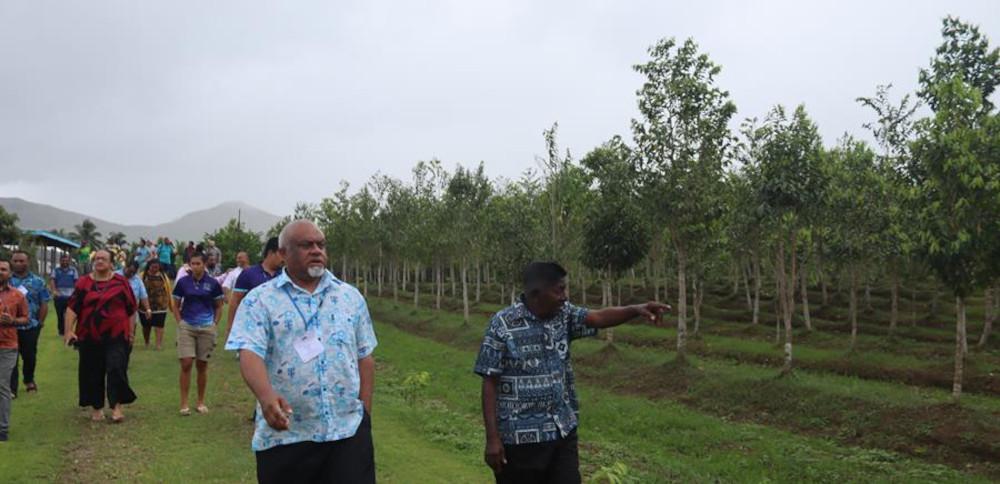Biosecurity and plant protection officers, development partners, Ministry of Agriculture representatives and IT experts came together in Nadi, Fiji, this week to train on electronic phytosanitary (ePhyto) certificates. The training represents a crucial step forward to improve agricultural trade facilitation and safeguard regional food security.
The event was funded by the Australian and New Zealand Governments through the Regional ePhyto project and supported by the European Union through the Pacific Community (SPC) implemented Safe Agricultural Trade Facilitation through Economic Integration in the Pacific (SAFE Pacific) project.
The ePhyto certificate is the electronic equivalent of a paper phytosanitary certificate issued to indicate that export consignments of plants, plant products or other regulated articles meet specified import requirements. The certification ensures the continuity of trade despite travel and shipping limitations. It also improves trade efficiency by reducing the time and cost of sending paper certificates from country to country.
"The International Plant Protection Convention (IPPC) ePhyto initiative comes at a crucial time when our members are faced with different dilemmas as a result of the COVID-19 pandemic. This platform will ensure that members are kept connected, that challenges are shared, advice is being sought out and that information and guidance are being provided by the entire Pacific Plant Protection Organisation (PPPO),” said SPC’s Land Resources Division Director Karen Mapusua at the opening event.
The training taught participants about new developments in ePhyto and shared implementation experiences from different countries. Participants also checked their newly learned ePhyto skills by sending test certificates to other countries during the workshop to gain hands-on experience using the Generic ePhyto National System (GeNs) portal.
GeNS is a centralised web-based system used to create, send and receive ePhytos between the National Plant Protection Organisations (NPPOs) of two trading countries through the IPPC Hub.
“ePhyto enables governments to share phytosanitary data well before a commodity’s arrival. As a result, importing countries save time in determining compliance and can address any biosecurity or documentary issues directly with the exporting authority. This will help to pre-plan their inspections, logistics and testing,” said PPPO’s Vice Chair Mr. Nacanieli Waqa.
The ePhyto Solution leads to better regulation of plant exports and imports across the Pacific region and provides efficient market access opportunities at a reduced operational cost.
“Developing countries in the Pacific are often at a disadvantage when it comes to adopting technological advances, and continue to rely on paper certificates,” said Mr Waqa. “Many Pacific countries share common hurdles such as funding, infrastructure, personnel and training. The successful implementation of GeNS in the Pacific will result in a consolidated approach by Australia and New Zealand to support the ePhyto Solution.”
Key development partners working in collaboration to implement the ePhyto Solution in the region include the Global Alliance for Trade Facilitation (GATF), World Bank Group (WBG) and PACER Plus.
A number of countries such as Argentina, Chile, Fiji, Ghana, Morocco, Netherlands, New Zealand, Sri Lanka, Samoa and USA are already operating the system to transmit phytosanitary certificates safely.
As part of the training, a field trip was organised to the Sigatoka valley to attend the launch of the first Tahitian lime export from Fiji to New Zealand. In addition, participants had the opportunity to follow the process from production to the ePhyto issuance phase.
Mr. Waqa concluded that the improved ePhyto implementation plan recognises and reflects on the importance of regional coordination, identifies synergies and operates in a complementary way for better delivery of activities that address Pacific country and territory needs.
Media contacts:
Maryann Lockington, Communications Officer SAFE Pacific, Pacific Community (SPC), Land Resources Division | [email protected] or (679) 3370733
Ilaisa Dakaica, Coordinator - Regional Electronic Phytosanitary (ePhyto) Project, Pacific Community (SPC), Land Resources Division | [email protected]
For general media enquiries, please contact [email protected]
About SPC:
The Pacific Community has been supporting sustainable development in the Pacific, through science, knowledge and innovation since 1947. It is the principal intergovernmental organisation in the region, owned and governed by its 27 member countries and territories. www.spc.int
Follow SPC News | Facebook | Twitter | LinkedIn | Instagram | YouTube and subscribe to SPC's Newsletter
